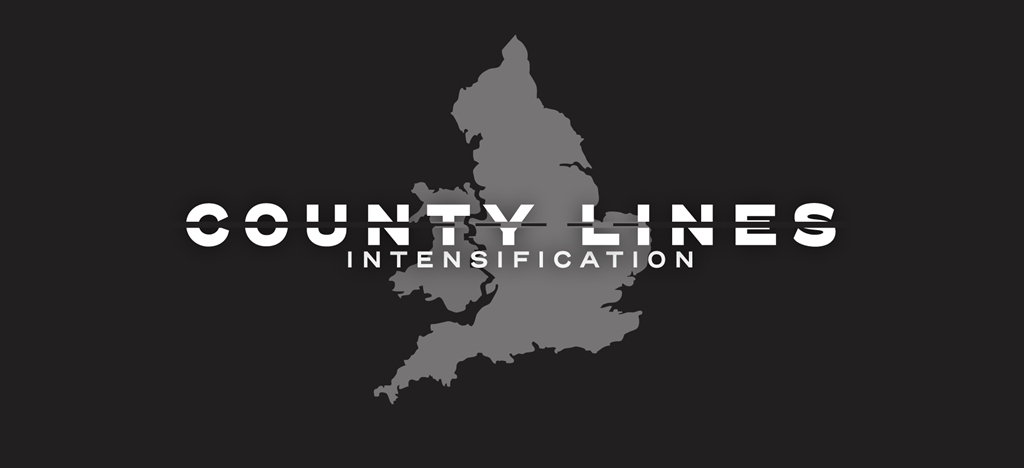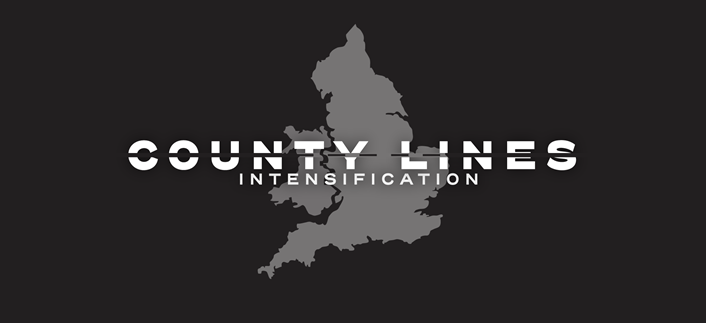
20 Oct 2023
County Lines Gangs smashed in national police operation
- Over 1,600 arrests during county lines crackdown in national police operation last week
- Over 100kg cannabis seized alongside over £1.2m worth of Class A drugs
- 710 vulnerable people referred to safeguarding
Drug gangs across the UK were targeted in a national police operation last week, leading to 250 county lines being taken down and 1,613 arrests.
The County Lines Intensification Week, coordinated by the NPCC-led National County Lines Coordination Centre (NCLCC), also saw 103kg of cannabis seized, alongside 40kg of Class A drugs worth over £1.2 million, 33 firearms, 377 bladed weapons, and over £1.2m in cash, as forces made large gains against these gangs and the products that finance their exploitative criminality.
710 vulnerable people, including 58 children were also referred by police to safeguarding services through the national operation. Exploitation, coercion, and violence are cornerstones of the county lines trade, and cannabis is used by gangs to trap young people into debt, forcing them to transport their drugs and sell to other children to continue the cycle. By rescuing these vulnerable people from the grip of these gangs and helping them into support services such as the Home Office-funded Catch 22, this cycle of violence and abuse is being broken.
In one operation attended by the Home Secretary during the National Police Chiefs’ Councils (NPCC) Intensification Week in the West Midlands, £850,000 worth of cannabis was seized from cannabis factories, with more than 850 plants and nearly 6 kilos of dried cannabis recovered.
Last week’s enforcement successes come as new Home Office statistics show that since April 2022, 1,700 lines have been taken down though the government’s County Lines Programme, alongside 3,300 arrests and 4,100 vulnerable people referred to support services, highlighting the success law enforcement, government and support services are having in bringing down this heinous criminality.
National Police Chiefs’ Council lead for County Lines, Commander Paul Brogden, said:
“County Lines drug dealing destroys lives, and we are committed to tackling the supply of illegal drugs, and the exploitation and violence that is frequently associated with it.
“County Lines remains a top priority for policing and our latest intensification week figures show significant inroads policing has made into these criminal networks with 250 county lines closed during the week. Not only that, but we have continued to go after the line holders and arrested over 1,600 criminals involved in county lines and taken extremely dangerous weapons, including 33 firearms off the street.
“Our message is clear to anyone running county lines across the country; we will be relentless in our pursuit of you, we will shut down your county lines, we will take drugs off our streets and we will rescue those who are being exploited by you.”
Home Secretary Suella Braverman said:
“Vile thugs running county lines drug gangs blight our communities and groom the most vulnerable in society for their personal gain.
“Our police officers are working every day to break up these criminal networks pushing illegal drugs on our streets, and since April 2022 they have shut down over 1,700 county lines through the County Lines Programme.
“My message is clear. We will not tolerate illegal drugs of any kind, and we must rid our communities of these criminals.”
The intensification week, which ran from Monday 9 October to Sunday 15 October, saw:
- 250 county lines taken down
- 1,613 people arrested
- 458 weapons seized, including 33 firearms, 377 bladed weapons, three crossbows, 21 batons and 28 knuckle dusters
- Over £1.2m worth of Class A & Class B drugs seized
- £437,000 worth of crack cocaine, £100,000 worth of heroin, 40kg of cocaine and 103kg of cannabis seized
- £1,284,729.88 in cash seized
The government established the County Lines Programme in 2019 to tackle the abusive and violent county lines trade, providing forces and victim support services a clear strategy to end the terror these gangs inflict on our streets. Adopted by the four forces that face the majority of county lines criminality – Metropolitan Police, Merseyside, Greater Manchester and West Midlands Police – the County Lines Programme closed over 1,700 lines between April 2022 and June 2023, achieving in just over a year 85% of the three-year target set in the 2021 Drug Strategy.
Key to the Programme is victim support, and the government has put up to £5 million into services such as Catch 22 and Missing People’s SafeCall service to help young people and their families as they escape these gangs. To continue to help these victim support services and front-line workers, updated guidance has also been published by the Home Office today that will aid the identification of potential victims and appropriate safeguarding referral routes, and ensure those who are in need receive help.
James Simmonds-Read, National Programme Manager at The Children’s Society, said:
“Criminals groom young people in person or online and use terrifying threats and violence to force them into crimes such as carrying drugs and fraud or exploiting them sexually.
“This Awareness Week we want to highlight how exploitation can happen to any young person, anywhere, and as the nights draw in, we especially urge people to spot the signs of exploitation in public places after dark.
“Young people can be targeted at fast food outlets, forced to travel on trains and in taxis late at night, and are abused behind closed doors, in hotels and holiday lets.
“Whether you are on a night out, commuting home, staying overnight for a business trip, or working as a driver or in customer service, you could be the one that gets help.
“Call the police on 101 or 999 if there is an immediate risk. If on a train text British Transport Police on 61016. Alternatively, you can contact the NSPCC for advice on 0808 800 5000.”
Contact information
Communications office
By phone: 0800 538 5058
By email: press.office@npcc.police.uk

